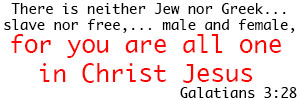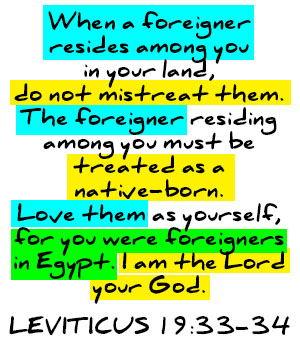The Jesus Movement
2000 years ago, a young rabbi walked the shores of the Sea of Galilee in what is now Israel, and called several fishermen to join him in a journey that would change the world. That rabbi was Jesus and what He taught was revolutionary. His critique of the religious leaders of His day got Him into trouble and for that, He was executed Roman-style, crucified on a cross. His life and death was a fulfillment of ancient Jewish prophecy and was an act of atonement for the sins of all people past, present and future. His message was love... love for all people regardless of who they are.

15 centuries after Jesus lived, numerous brands of ultra-conservative Christian movements were started in Europe as a result of cultural changes there. Eventually many of these "Puritans" were chased out of Europe becuase their brand of Christianity was not welcomed by the larger, more moderate versions of the faith. Once in the New World, these religious minorities became the majority and established a new tradition of strict interpretations of Biblical scripture, setting up rules in society that forbade things like dancing, music, drinking, not to mention lots of don'ts regarding human sexuality.
The irony is that if you read what Jesus said, he never really made a big deal about those things. One thing He did care about, though, was religious hypocrisy.
Religious life in America, for many, became more about enforcing rules than about practicing love. Even horrific acts such as burning "witches" at the stake (which goes against the 6th Commandment, Thou shalt not murder) were done in the name of the Christian faith. Jesus never burned people at the stake nor did He tell others to do it. No surprise then, that conservative American culture also used the Bible to justify brutal forms of slavery, the opression of women and the harsh beating of children as punishment... things Jesus would likely not have agreed with.
Jesus stopped the stoning of a woman accused of adultery by asking the people accusing her to throw stones if they were themselves free of sin. So if people burned women because they thought they were witches, how were they following Jesus' teaching? And if they did those kinds of things in America 400 years ago in the name of Jesus, is it any wonder why people in America today, which , will say or do crazy things today in the name of Jesus that go against His very essence?
![]()
About 110 years ago, a new Christian movement focused on getting people fired-up for and recommited to Jesus by being "born again". Interestingly, this movement began in Southern California. This new brand of Christianity called Pentacostalism, explored the mystical and charismatic side of the Christian faith, including healings, speaking in tongues and other manifestations of Holy Spirit. Out of these tent revivals, a new Christian culture was born from which much of modern evangelical Christianity is rooted.
In modern times, these two traditions, Puritanism and Evangelical Christianity, have often merged to form what we call today "conservative fundamentalism." A lot of good has been done over the years by folks practicing this version of the faith, but also a lot of damage. People intending to do good have taken the Bible and distorted its message to justify the segregation of various ethnic groups, the subjugation of women and, most recently, the ostracism of LGBT people from the family of God.
As a part of this modern movement, fear of a life in Hell is again used as a method to motivate people to "Turn or burn." So, much like the Puritans before, the fundamentalists of the past 100 years tought that God hates sin and thus God hates anyone who commits sin and does not repent of those sins and turn to Christ. But this isn't exactly what Jesus had in mind. Afterall, the Bible says "God did not send God's Son to condemn the people of the world... but to save them."
This is not the first time Hell was used to scare people into believing; and for the vast majority of Christians, Hell is a very serious topic of discussion, but let's be honest:
![]()
Don't believe this statement? Read the Bible and count the number of times "Hell" is mentioned versus the number of times the names "God," "Lord," or "Jesus" appear. We'll save you some work... of the nearly 33,000 verses in the Bible, nearly 1/3 (over 10,000) mention the words God, Lord or Jesus. "Hell" is mentioned just 15 times.
We have more important things to do than be worried about who is and who isn't going to burn in Hell. God is much more concerned about your heart. Jesus is much more concerned that you activate your heart and do something about the suffering in the world. Jesus wants you to get involved in making this world a better place, not tear people apart and blame them for all the bad in the world.
Some fundamentalists have looked to natural disasters such as earthquakes, hurricanes and fires as evidence of God's judgement upon those who approve of equality for LGBT persons. We've even seen them show up to funerals of servicemembers who died in war to protest changing government policies on equality in America... and what is most unnerving to many is that they do it in the name of God and in the name of Jesus.

These extreme trends are no different than what Jesus saw in His day as practiced by the religious elite and the culture at large. We know this because much of the Gospels are filled with Jesus ministering to, healing and spiritually restoring people on the fringe of His society. Lepers, tax collectors, Roman soldiers, women who committed adultery... these were people who were despised, rejected or worse by people in the Holy Land during the 1st Century. Jesus sought them out and made it His mission to be an example to others of God's unfailing, unconditional love towards all people, including and especially to those on the margins of society.
Jesus taught women and men together in the same place as equals; something that was not done back then. Jesus physically touched many people considered "unclean" by religious law. He did not require people to follow Kosher eating practices. He advocated the mixing of Jewish and non-Jewish people and specifically praised Gentiles (non-Jews) for their faithfulness to God (something many rabbis of His day would have called heresy). Most defining, he called out the religious leaders of the day and labeled them hypocrites, publicly humiliating them and accusing them of seeking their own glory rather than the glory of God. He got put to death for that.
In Christ we have a model of a way of life that is liberating - both for ourselves and for others. To be a Jesus follower means that you can abandon what people have told you about Christianity and how others define what it means to be a "good person." Instead, you receive personal affirmation directly from your God, through the salvation and grace offered by Jesus. In Christ, you can drop all the labels... you can let go of religious baggage from your past and ignore the religious haters of today. Instead, you can take up the yoke of a rabbi who believes in your capacity to do great things in God's name, regardless of who you love, what you look like, who you associate with or what others define you to be.
You have a choice to say yes to a personal relationship with your Creator through Jesus Christ. No other human being can interfere with and nothing you've done can separate you from this relationship. It's a life-changing commitment that will send you down a path of personal transformation, empowerment and freedom and a path on which you will never walk alone, for there are many more like you who need Jesus just as much as you.
It's more than a religion. Come be a part of this movement that strives for equality and unconditional love in full relationship with one another and with God.






